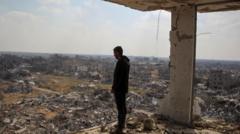Trump's recent suggestion to take control of Gaza has drawn significant criticism, as it challenges decades of diplomatic efforts for a two-state solution and ignites discussions on the implications of U.S. ownership over the region.
Trump's Controversial Gaza Proposal: Can the U.S. Lay Claim to a War-Torn Region?

Trump's Controversial Gaza Proposal: Can the U.S. Lay Claim to a War-Torn Region?
Donald Trump asserts that the U.S. could "take over" Gaza amid discussions of regional reconstruction, prompting worldwide backlash and raising questions about U.S. foreign policy.
Former President Donald Trump's provocative assertion that the U.S. could "take over" Gaza has sparked outrage and confusion, especially as hostilities between Hamas and Israel have ceased, ushering in a new phase of consideration for Gaza's reconstruction. With an alarming estimate of two-thirds of Gaza's infrastructure reportedly destroyed or damaged following 15 months of conflict, Trump's comments could indicate a radical shift in U.S. strategy in the often volatile Middle East, which traditionally leaned toward supporting the formation of a Palestinian state alongside Israel.
Various leaders, including Israeli Prime Minister Benjamin Netanyahu, have responded to Trump's remarks with interest, yet many Arab nations and key U.S. allies have firmly rejected the notion. Analysts suggest that Trump's proposal could signify a desperate attempt to find a solution to an ongoing crisis that pervades U.S.-Middle East relations, as traditional approaches have continually failed to yield results.
The backdrop of Trump's comments includes a harrowing reality: as people in Gaza grapple with the aftermath of extensive urban destruction, many thousands remain trapped in dire conditions. Pointing out the impracticality of rebuilding with a significant civilian population displaced amidst the rubble, Trump highlighted the need for relocation. However, rather than advocating for relocation within Gaza or temporary encampments nearby, he suggests permanent relocation outside its borders.
Such a proposition has been met with horror, evoking painful historical memories for Gazans, many of whom descend from families that fled or were expelled during the 1948 Nakba, which Palestinians commemorate as a catastrophic loss. The implications of Trump's ideas would further alienate the possibility of a future Palestinian state, emphasizing a narrative that contradicts long-held international law principles regarding statehood and territorial rights.
Could Trump feasibly enforce such a plan? While he lacks any legal claim to Gaza, questions about his genuine intentions persist. Some speculate that these remarks serve merely as a negotiating tactic rather than a concrete proposal, reflecting a broader U.S. need for diplomatic maneuvers.
Efforts towards establishing a unified governance for Gaza have stalled, with divided opinions within Palestinian factions regarding future administration. Meanwhile, any discussion of U.S. military or peacekeeping presence has always been juxtaposed against public rejection of such involvement, particularly concerning any semblance of civil or military occupation.
As international negotiations continue amid fluctuating ceasefire commitments between Israel and Hamas, the ramifications of Trump's rhetoric on an already complex geopolitical climate remain to be seen. Should it be perceived that the intent behind U.S. policy strategies signals a comprehensive removal of Palestinians from Gaza, tensions could escalate, potentially disrupting already fragile dialogues.
Adding to the complexity, Trump's stance on the West Bank hints at a larger, potentially disruptive pivot for U.S. diplomacy that may disregard established international agreements sufficiently tightening the noose around hopes for both a two-state solution and regional stability. The unfolding drama emphasizes the need for careful deliberation and sensitivity toward the human aspects involved amidst the turbulent realm of international relations.






















